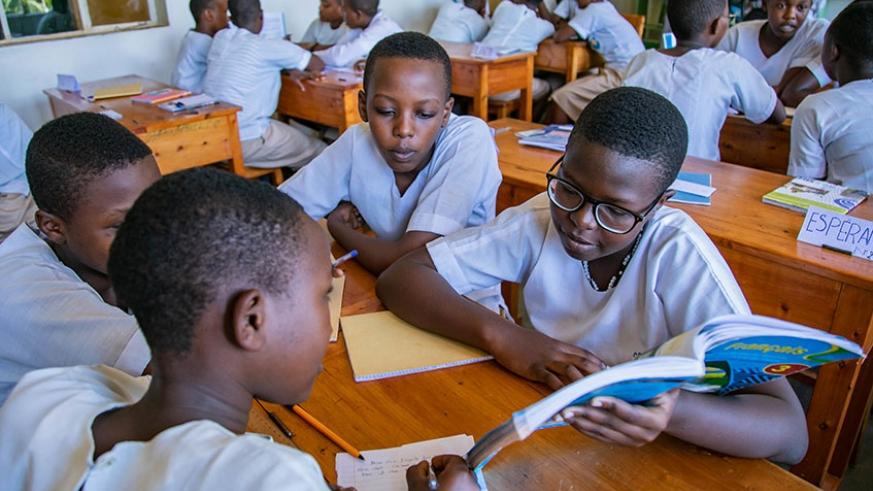Africa-Press – Rwanda. There seems to be a proposal to review the curriculum of the different levels of general education in Rwanda that would lead to an increase in the number of subjects and teaching hours.
Under this proposal, the number of subjects at A- Level would increase from six to nine compulsory subjects per learner per combination and at lower secondary to 16. This proposal is a matter of serious concern and has grave pedagogical implications that must be looked at very carefully before it is implemented.
The review should, in the first place, be based on an extensive evaluation of the existing curriculum that is itself the result of an overhaul done by professional and experienced educationists from Rwanda and around the world.
Let us first examine the number of teaching periods suggested in the proposed changes. The proposal of 52 periods a week and 1365 teaching hours per year at every level of general education right from primary implies that there are 10.4 periods per day assuming a five-day school week, or 8.67 periods per day if the school time is six days a week. The question then arises: how will the learners fit in those periods daily?
Such a number of periods is far beyond the limit of internationally accepted standards based on UNESCO recommendation of 900 periods per year, which is much less. Implemented as is proposed would lead to a heavy load on learners with disastrous consequences.
In any case, change of this nature is only pedagogically justifiable when it is deemed to lead to a fundamental transformation in keeping with national aspirations and the development of individual learners. Let us also look at the proposal to raise A-level subjects from six to nine compulsory subjects. A little background will help.
The choice to introduce A Level combinations of 3 or 4 principal subjects and general paper was not by accident. It was the philosophy adopted to give Rwandan students a more in-depth subject coverage in preparation to meet entry requirements of top universities around the world, especially in Commonwealth countries and other countries that require 3 principal subjects only.
Entrepreneurship as a core principal subject and one language elective subject for all combinations were added later to make a total of six subjects for all combinations at A Level.
The assumption was that the coverage of the 3 official languages in primary and lower secondary was enough based on the syllabus contents already developed. That situation has not changed.
The curriculum that is being implemented since 2015 is Rwandan in nature but benchmarked with the best practices from different countries and reputable educational institutions.
It and syllabuses based on it are, in fact, a hybrid benchmark of curricula and syllabuses from the region and beyond, especially from some Commonwealth and South East Asian countries, and International Baccalaureate Diploma
The Rwandan curriculum today is not in any way inferior because the learning programmes or subject contents are up to standard and it can be verified through comparison with the syllabuses and of content of other systems such as Cambridge and International Baccalaureate
Curricula get reviewed periodically the world over, but there must be compelling reasons for this and a definite purpose to be achieved. Most countries and institutions which identify the need to reform and overhaul the school curriculum for any level of education do it for substantial justifiable reasons, such as a restructuring of the entire education system.
If there is no such restructuring that dictates the change, the main purpose of the review is normally to streamline the content gaps or overloads or pedagogical approach that hamper the teaching and learning processes, and to evaluate whether the learning outcomes required by individual needs of the learners, the society, and the labour market have been achieved
The other purpose is to ascertain whether the learners are able to demonstrate the skills, knowledge and competencies described in the existing curriculum and to be able to adjust them to the needs of the society and national aspirations.
The individual subjects to be developed and teaching hours or periods to be covered per week or per year ought to be appropriate and responsive to the needs of the learner and national aspirations.
Education policy makers should therefore be cautious about why the curriculum must be reviewed and why the number of subjects and teaching hours at all levels must be increased.
They should rather put more effort in supporting implementation of the curriculum which is not being done at the desired pace and intensity. As it is, some policies meant to reinforce the implementation of the current curriculum are not fully in place.
For instance, such key elements as curriculum and assessment policy, languages policy, and learning and teaching materials policy have never been forwarded for approval since 2016, although they are quoted in the education strategic plan as part of guiding documents.
Implementation also involves monitoring and evaluation of the learning processes and continuous training of teachers in the pedagogical approach in competency based learning to strengthen learner-centred approach.
According to education experts, increasing the number of subjects and teaching hours per day creates an overload on learners and poses a real danger to a balanced social and intellectual development. Such overload is often associated with learners’ stress which results in negative attitude towards learning and decrease in overall performance.
Conversely, there are proven benefits in having a reasonable number of subjects. This enables the learner to gain deeper knowledge of the subject and to develop richer understanding and higher order thinking ability.
It aids more active learning which in turn increases learning motivation that includes the development inquiry and research skills If students are not allowed sufficient time to explore new concepts in a meaningful way and if the curriculum is not flexible, it leads to poorer outcomes in terms of learners’ achievement.
Experts also argue that, if the subject content is transferred to learners’ personal time as homework or assignment, it eventually has a potentially negative impact on students’ mental and physical health. Excessive learning hours or excessive number of subjects for homework is also a common challenge when addressing curriculum overload.
Therefore, they argue, learners may need to spend extra time studying outside school hours on top of regular extra-curricular activities which might interfere with time to socialise and be with friends, time to play, time to exercise and time to sleep.






